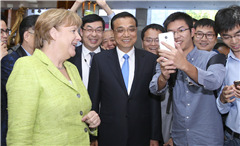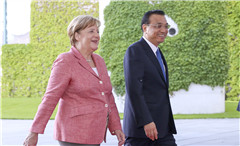China and Germany sign 11 pacts
2017-06-02
China Daily
China and Germany signed a basket of deals on June 1, many on crucial areas like automatic driving and aviation.
Premier Li Keqiang and German Chancellor Angela Merkel witnessed the signing ceremony after their meeting on June1.
Among the 11 deals and cooperation documents signed was a memorandum of understanding between Beijing Automotive Group and Daimler AG on increasing investment and strengthening strategic cooperation in new energy vehicles.
Baidu and Bosch signed an agreement for strategic cooperation on autonomous driving technology.
The National Reform and Development Commission signed a memorandum of understanding with Airbus on strengthening comprehensive cooperation.
“We will continue to work hard together to promote the development of electric vehicles and to create a favorable environment for the existing auto market,” Premier Li said at a news conference after the signing ceremony.
He also said “dozens of agreements” were signed during the visit, covering areas such as trade and openness.
Merkel said she discussed Article 15 of the protocol on China’s accession to the World Trade Organization with Premier Li.
Under Article 15, WTO members were to end after Dec 11, 2016, the organization’s surrogate country approach regarding anti-dumping investigations of China. The date was exactly 15 years after China’s admission to the WTO.
Under the surrogate country approach, WTO members use costs of production in a third country to calculate the value of products from countries on its “non-market economy” list, which includes China.
Germany believes the European Union should fulfill the responsibilities of the protocol, and it will make efforts to find a solution that is in line with the WTO rules, is fair to all nations and does not discriminate against China, Merkel said.
Premier Li appreciated Germany’s stance on the issue, saying that moving forward, not stepping back, is the way toward progress.
Premier Li and Merkel also said they agreed to speed up the process of signing an investment treaty, which will assist with discussions on a free trade agreement.
Gu Junli, a German studies expert at the Chinese Academy of Social Sciences, said Germany will “gradually take a leading role in pushing the EU to fulfill its promise regarding Article 15”.
German Ambassador to China Michael Clauss told China Daily, “The EU and China both support rules-based global free trade with a strong WTO as its core, and they should demonstrate this commitment by rapidly negotiating a China-EU investment treaty and possibly going even further-toward a China-EU free trade agreement,” he said.
“There is a growing overlap of common interests, in the G20 framework and beyond, whether it’s promoting free trade, combating climate change, or supporting a strong EU, UN and WTO,” Clauss said.
Premier Li and Merkel held the annual prime ministers’ meeting between the two governments on May 31 after Premier Li’s arrival in the German capital.
Premier Li called on Germany to help China’s large passenger plane, the C919, earn an airworthiness certificate from the EU.
The twin-engine C919 made its maiden flight on May 5 in Shanghai with five crew members on board but no passengers. The success makes China the fourth large passenger jet producer after the United States, Western Europe and Russia.


